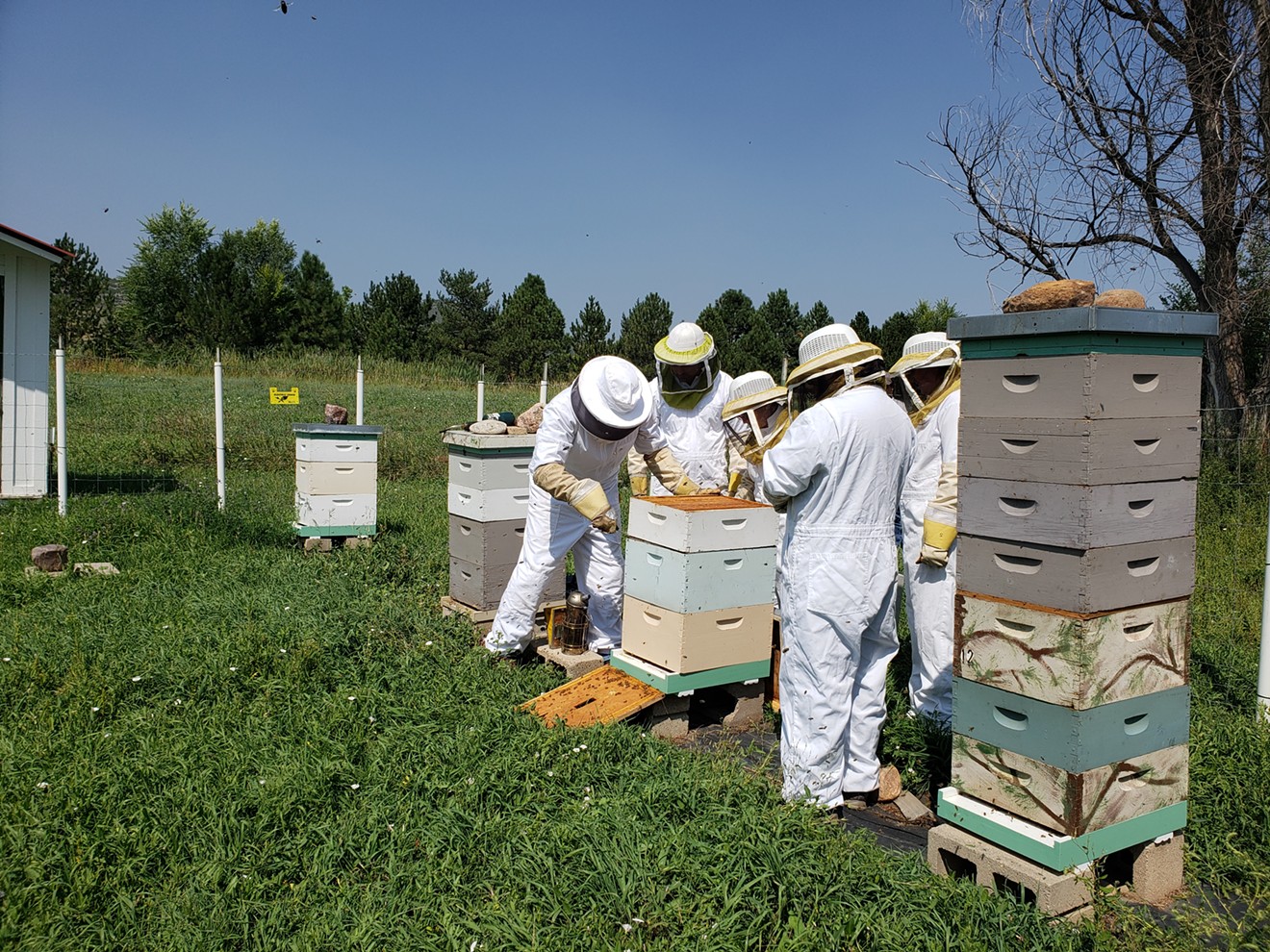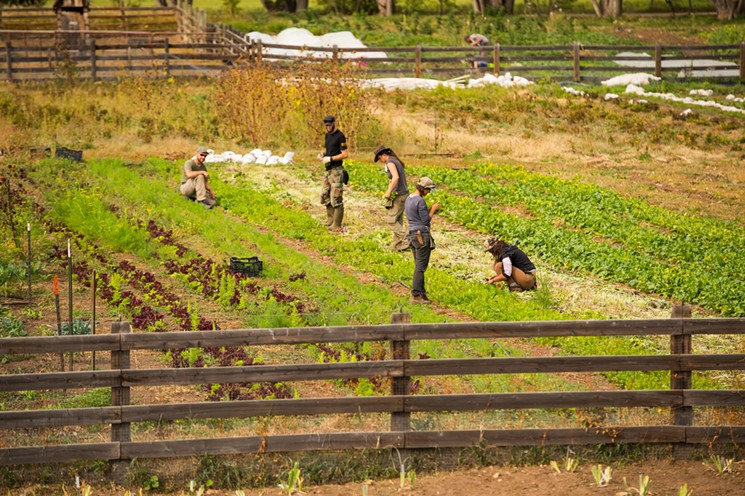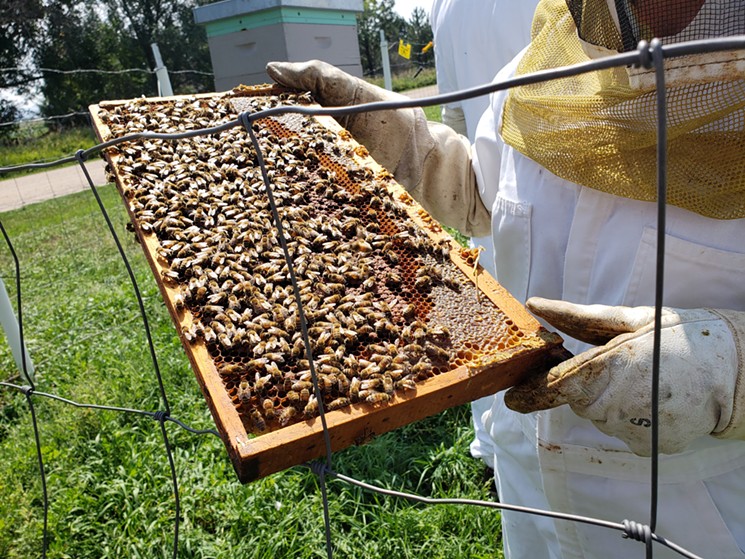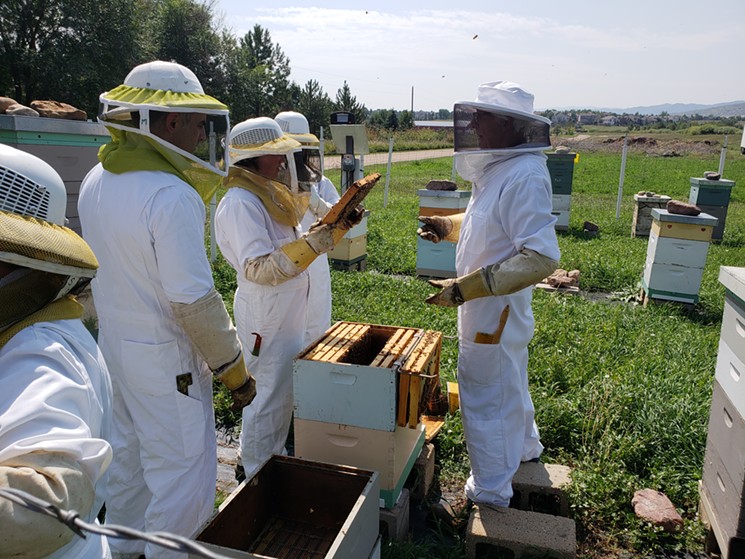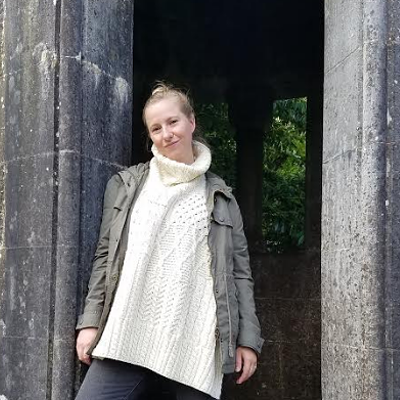At the Denver Botanic Gardens Chatfield Farms, three eager military veterans don the head-to-toe white jumpsuits and netted hats commonly used by beekeepers about to dive into a hive. Led by Jamie Wickler, education coordinator for the farm, the veterans are here as farming students, to learn about growing produce, raising livestock and, yes, tending the bees that were buzzing around their heads as they inspected trays of honeycombs.
The program the students are enrolled in is called Veterans to Farmers and was started in 2013 by Air Force veteran Rich Murphy and Marines veteran Buck Adams. While Adams stepped down last year, Murphy has been going full steam and expanding classes and opportunities all over Colorado. Since 2015, Murphy and Wickler have hosted two ten-week classes and one advanced winter seminar on the farming practices at Chatfield Farms. Some courses focus on planting, others on harvesting, and some cover greenhouse management. But no matter what the students are doing, the idea is the same: to give veterans a chance to see what it's like to work the land so they can decide if this is a path they want to follow.
"There's not a set way on how farmers become farmers, and it's awesome for them to see different models of what they might want to be," says Wickler, who runs the ten-week courses throughout the growing season. "I just don't want anyone coming out of the program thinking farming is easy and you can just take on an acre."
"You learn to fail, which is better to learn in the garden than in other places in your life," adds Murphy. "There are a lot of lessons you can learn by playing in the dirt."
While the students find out how to work the land, read the weather, grow plants, use hydroponics and aquaponics, and tend to certain animals and insects on the property, they also get taught about writing a business plan to run a farm and how to do bookkeeping and other practical skills needed for day-to-day operations.
"It's easy to fall in love with farming, but there is the financial side," says Wickler, who strongly encourages apprenticeships once the classes are over.
As the three students work with Air Force veteran Bob Dolezal and his wife, Josie, one man stands off to the side to watch. A veteran too, Cameron Estrada says he had to skip beekeeping because he had just eaten a banana, and beekeepers believe the smell of bananas mimics the alarm pheromone bees emit, which means it could make them more aggressive. Despite that, he follows along on the other side of the fence as his cohorts examine the hives, asking questions as they come out of the bee zone.

From left to right: Richard Stroder, Jamie Wickler, Daniel Hoffman, Jessica Netzel and Cameron Estrada, the newest crop of veterans to work Chatfield Farms, save for Wickler who is the coordinator of the program.
Linnea Covington
For him, the farming program provided another notch in his healthy-living belt. A former Marine, Estrada had started looking closely at food thanks to his wife, a "lifelong" vegetarian, who showed him how most of the fast food he was eating got processed. After he learned about it, he found himself avoiding fast-food establishments. As a member of the Denver Botanic Gardens, his wife found out about the veterans' program, and Estrada was happy to sign up.
His classmate, Richard Stroder, found the program through research. He was working in IT in the Marines, and when he entered civilian life, he continued a career in technology, something he was no longer fond of.
"It was really unfulfilling, and I was doing it for twenty years," Stroder says. "I wanted to do something else, and I wanted to be outside, and I wanted to connect to the world around me. Not doing that was making me depressed."
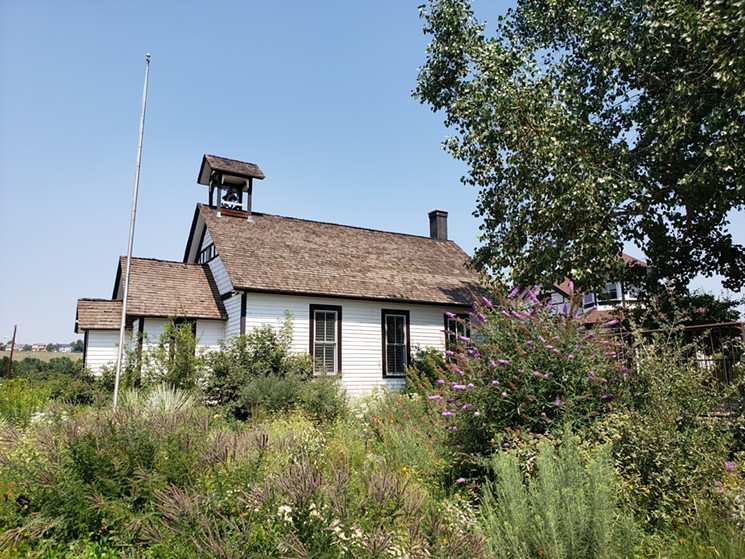
The school house at Chatfield Farms where a lot of the practical skills classes take place.
Linnea Covington
"Farming has become sexy in the last few years," says Murphy, likening it to Pinterest. "I don't care if they become full-fledged farmers, just as long as they can grow something on their own."
Murphy, who started farming while stationed at Buckley Air Force base with his wife, LeeAnn, found his way to it by building raised growing beds that turned their back yard into a massive garden.
"The neighbors thought I was crazy, but then they told me they wanted to do it, too," says Murphy, who was a social worker after he left the Air Force and before the farming bug took hold. "Farming is contagious," he notes.
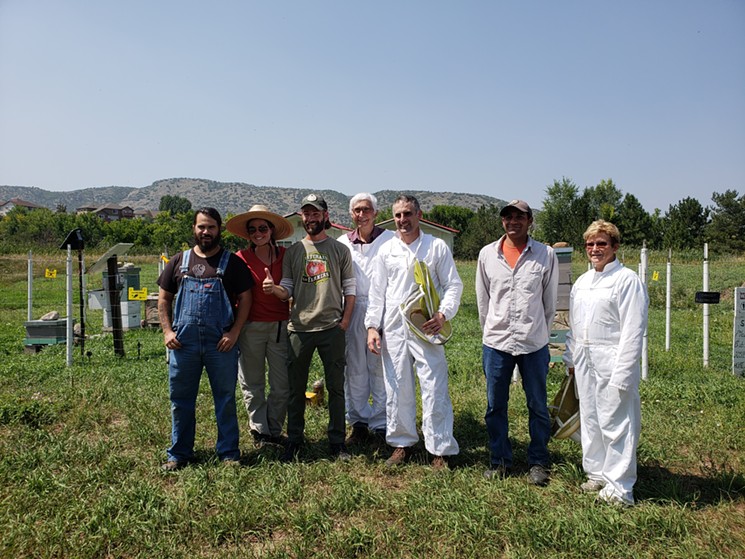
From left to right: Richard Stroder, Jessica Netzel, Rich Murphy of Veterans to Farmers, beekeeper Bob Dolezal, Daniel Hoffman, Cameron Estrada and beekeeper Josie Dolezal at Chatfield Farms.
Linnea Covington
Today the Murphys lives on a 35-acre space in Fort Collins (LeeAnn also does work with Veterans to Farmers) with their two children. They farm a large portion of their land, grow most of their family's food, and are building a greenhouse on the property.
Aside from her job with the botanic gardens, Wickler has a connection to farming, too. She is a homesteader with her husband and young son in Lakewood and helped start the Lakewood Homestead Collective. Dubbed Wild Wick's Farm, this third-of-an-acre plot grows enough produce to feed her family and sell at the South Pearl Street Farmers' Market along with the other homesteaders in her group.
Over the past four years, more than 100 veterans have graduated from this free program at Chatfield Farms. Some have gone on to be full-time farmers, others have decided to do something else, and for some, it's a mixed bag of skills and jobs. The hope, says Murphy, is to start getting families involved as well. Along with Chatfield Farms and and another class at Rebel Farms (an urban hydroponic farm), next year Veterans to Farms will also host classes at Bromley Farm, a historic property in Brighton, as well as with Altius Farms, an urban farm that also teaches inner-city youth about farming.
"I wanted to do ranching, and this was the closest thing around, so I thought I would give it a shot," says Army veteran Daniel Hoffman, after returning from tending the bee hives. "I really like it, though it's far more in-depth than I thought it would be."
And that's why it's important, says Wickler, to give these veterans a chance to really get to know farming.

